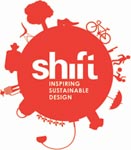Fresh Talent Sustainable Design finalists announced
The 16 finalist concepts for the Fresh Talent Sustainable Design Competition, run by Shift: Inspiring Sustainable Design, have been announced. Now in its third year, the competition started in September, with a call to young creatives to submit proposals and designs that addressed the issues of sustainability under the brief Small Change, A World of Difference.
Three winners will be chosen in February 2013 and awarded cash prizes and a knowledge exchange trip to Sweden to learn more about the Scandinavian ways of sustainable living.
Shift is a non-profit organisation that aims to raise awareness amongst young South Africans about the role that design can play in developing practical and sustainable solutions to every day challenges.
Finalists
- Rhaziq Arnold for Recycle, up-cycle and repair cultures, which addresses the issue of consumerism by creating a platform in which people can get together and revive old appliances, electronics, clothing, and furniture to be used again and generate income.
- Marnitz Malan for his Eco Dog Waste Compost, with the aim to design a special bin which will turn dog waste into compost.
- Keenan Jeppe and Nosipho Ngqula for Community Recycling. The concept is to design a recycling bin that can be placed alongside homes in township communities and a system to encourage households to be involved in recycling their trash.
- Bronwen Smith and Rudolph Jordaan for Integrated Sustainability Awareness System. This concept aims to address a large community, such as Cape Town, to be environmentally conscious through a points based system that could be loaded onto a card when doing 'green' deeds.
- Colin Tomas: Food Growing Booklet, which is an instructional guide, mainly illustration based and in all 11 official South African languages, that will help people to grow their own food. These books will be produced with seeds embedded in biodegradable paper that dissolves quickly and allows the seeds to germinate.
- Robyn Minnie for Trash Quencher. This concept will create awareness of the value of waste in a very light hearted, fun way by using vending machines that will only accept a certain quantity recyclable litter in exchange for a free cool drink.
- Bianca Nakan for Green Rooftop Shelf Life which aims to create space saving and self-sufficient garden patches by means of a shelf/trough mechanism on top of township shacks or low-cost housing.
- Steve November for Rooftop Gardens on Shacks. To address the issues of insulation, lack of space, and sound proofing by creating rooftop gardens on top of shacks/low cost houses.
- Shamiel Van Der Schyff and Ghazeem Rabin for The Moringa Project which will educate the community about the advantages of using Moringa Oleifera seeds to purify water.
- Nadia Smith for Femaway. The concept is to create a biodegradable sealable bag that would be used to dispose of female hygienic products and can be thrown into the ground as fertilizer.
- Carmen Johnson and Chenjerai Kamushinda for Plastic Floor Bathing Tub which is a specially designed bathtub for use in small spaces common in shacks in townships and made out of recycled plastic. The bathtub can be easily put up or folded away when not in use.
- Kina Meyer for Change Clothes which aims to create a website that would sell quality second-hand clothing donated by the public giving old wardrobes a second life.
- Donovan Wallis for Dynamo which aims to create a sustainable device that would generate electricity for people with little or no access to it.
- Gaironesa Clayton and Chad Atkins for Sustain no pain which will create a mechanism that uses old paper and turns it into a paper brick which can replace firewood, therefore promoting recycling and also helping to solve the problem of deforestation.
- Ryan Allan for RE: H2O. To filter bath and laundry water on-site so that households will have greater access to clean water. This additional source of water can be channelled into productive systems such as food gardens or bamboo production, providing opportunities for economic activity and environmental rehabilitation within low-income and impoverished communities.
- Johan Van Den Heeven for A-House which addresses the need to build low cost housing by using a "snap together frame house" design.
Next step - mentorship
Janine Johnston, CEO of Shift says, "This year's entries were very difficult to judge as we received so many great designs and concepts. What we eventually whittled it down to was to ask if it met our focus, which is to position South African youth as pioneers of the country's green economy. We were looking for simple sustainable design solutions that showed the potential to drive change and respond to the country's sensitive socio-economic and environmental challenges and that are able to deliver wide scale impact - promoting equitable growth and efficient use of materials and energy. The next step is to match each of the finalists with an appropriate mentor to assist them in refining their concept and to build the prototype."
The sixteen finalist prototypes will be exhibited throughout the country in 2013 and will be featured in Shift's exhibition in Sweden in the second half of the year.
For more, go to www.theshift.org.za or watch www.vimeo.com/theshift.

























